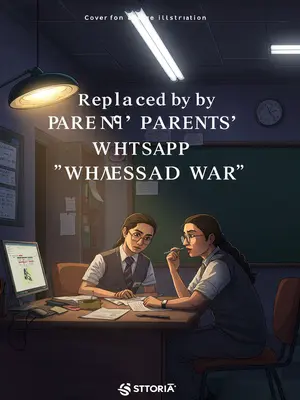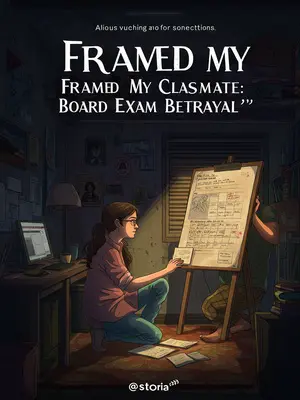Chapter 2: The Farewell of a Mother
The Governor’s wife, regal as always in her crisp silk saree, looked at me sitting on the floor at her feet, my head bowed. Her eyes, usually so steady, now reddened with sorrow. She reached down, dabbing my forehead with the edge of her pallu—a gesture both tender and traditional.
“Shalini, they are your own children, carried for nine months. Can you really bear to leave them?”
The question cut deep. Which mother in India—or anywhere—does not ache for her children? Thinking of Ishaan and Meera, my heart twisted, as if pricked by a thousand needles. In our country, mothers are expected to sacrifice everything, to swallow every humiliation, for the sake of their children. But what does a woman do when even her children turn their backs?
“Aunty, they are the bloodline of the Sharma family. Arvind will care for them. I only ask for a divorce!”
My aunt sighed, the sound heavy with unspoken histories. The rustle of her saree as she shifted reminded me of the many times she had comforted me as a child.
“Back then, Arvind was just a struggling lecturer. Among all the sons of respectable families, you alone chose him! Now, using your family’s influence, he has become an IAS officer, and yet you wish to divorce him! How strange the world is...”
Her words hung in the air. I could only bow my head, feeling bitterness and hurt rise in my throat. Tears blurred my vision; the room seemed to sway.
“Aunty, I have never changed. I never asked for my husband’s status or fortune—only for his whole-hearted devotion!”
Hearing the firmness in my voice, she softened. She rose from her seat, personally helped me up, and wiped my tears with her own pallu.
“The divorce papers will be ready in a few days. Go back, prepare, and make a clean break with the Sharma family.”
There is always settling of accounts at the end of a marriage, especially one woven with so much family pride and sacrifice. I took a deep breath, trying to steady my pounding heart, and left the Raj Bhavan, the sound of my footsteps echoing on the marble floors.
I returned to the Sharma bungalow, my old home now feeling like enemy territory. The moment I entered, the air was full of noise—the television blaring an old Bollywood film, maids running in and out with trays, the sharp aroma of masala drifting from the kitchen.
The main hall was lively and bustling, but I felt like a stranger passing through. Ishaan and Meera were making a mess in the small kitchen, flour everywhere, their laughter ringing.
Meera, frustrated that the gas stove wouldn’t light, nearly stuck her head into the burner. Her hair, tied in crooked plaits, had wisps falling into her eyes.
Afraid she would burn herself, I rushed forward, scooping her up into my arms. “Meera, be careful!” My voice was sharper than I intended.
Meera frowned, wriggling to be free. “Mummy, why are you here? I’m making a fire—don’t get in the way!”
I was stunned, feeling her rejection like a slap. I let her go, swallowing my pride, and turned to the maids hovering near the kitchen door.
“What are you doing, just standing there? The kids are not even six years old, and you let them fool around in the kitchen?” My words came out harsher, perhaps, than I intended. The maids looked down, shifting their dupattas nervously.
Ishaan, his face dusted with atta, turned to me with wide eyes:
“Mummy, Meera and I want to make laddoos as a birthday gift for Teacher Lata. Why are you angry as soon as you come back?”
That stung. The kitchen, my old territory, was now an alien place. The children were making a birthday gift, not for me, but for Lata Singh. The memory flashed of my own birthday, when the children barely muttered a quick “Happy Birthday” before running off to play. There had been no gift, not even a card.
I pressed my lips together, feeling the familiar ache in my chest. I told the maids to watch over them, then turned to leave. As I passed the window, I paused, watching a mynah bird peck at leftover crumbs on the sill before turning away, the world outside seeming freer than my own home.
Ishaan, usually quick to argue, looked surprised at my silence. He called after me, his eyes searching my face for some sign of forgiveness.
“Since Mummy is back, and your skills are the best, can you help us make a gift for Teacher?”
I stopped. For a moment, I wanted to gather them in my arms, but my heart had already grown cold. The love I had poured into this family had dried up, like yesterday’s tea left out overnight.
Before I became a mother, I’d never so much as boiled water. It was only after Lata Singh arrived as tutor that I learned to wake up before sunrise, roll out dough for rotis, pack Tupperware dabbas, and set out sweaters and shawls, instructing the maids in every detail. For three years, through sticky summers and foggy winters, I’d done it all—only to have Ishaan speak of my skills as if they were nothing.
But now, he wanted me to help prepare a birthday gift for Lata Singh.
I shook my head, bitterness rising like bile. “Mummy has other matters. Call the cook to help you.”
Ishaan’s shoulders slumped. Meera, already teary, bumped her head on the stove, blackening one cheek. She looked at me, eyes pleading for comfort.
I hardened my heart. If I am to let go, I must begin now. Better they learn to manage under Lata Singh than expect rescue from me when I am gone.













